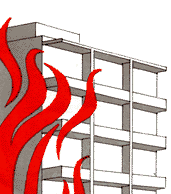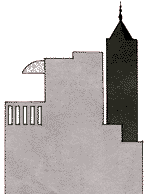|
Published: Winter 1999
GUIDELINES FOR SURVIVING A HIGH-RISE
FIRE
Tragic and avoidable deaths in two high-rise fires last December riveted
attention on the need for better, clearer understanding of how we can
protect ourselves and our families in the event of a fire.
There are many steps that we can take to optimize our safety if a fire occurs. These include being well-informed and well-prepared. Establishing, discussing and even rehearsing what to do helps every family member know what is expected of them in the event of a fire or other emergency.
The City Council Committee on Housing and Buildings held a hearing on fire safety in January. There, several misconceptions about fire safety came to the fore, including the idea that buildings should always be evacuated. Quite the contrary, experts stressed that, in a high-rise fire, if the fire is not inside your own apartment or directly above or below it, the safest thing for you to do is to stay inside your own apartment until the danger has passed. If smoke or soot are filling the corridors, block the bottom of the door with a wet towel or duct tape. People were also cautioned not to waste time trying to put out a fire on one?s own before calling 911.
Fire safety legislation will soon be proposed, based on input from these hearings. It is likely to require sprinklers in new residential high-rise buildings. To improve fire safety in existing buildings, it will also require systems for warning buildings about fires and other emergencies. Public address systems are favored by the Fire Department over alarms because alarms ?don?t tell you what to do.? However, acoustics and language needs must be considered if public address systems are to work effectively. CNYC will continue to monitor progress of fire safety legislation and will keep members informed.
To help your building and its residents prepare to face a fire, we reprint below an excellent flyer prepared by the Real Estate Board of New York.
FAMILY EMERGENCY PLAN
Family fire drills ensure that every family member is prepared to cope
if a true emergency arises. Panic and problems can often be avoided if
you have discussed where to go (front door, back door, parents? room),
what to take with you if time permits (shoes, jacket, keys), and what
precautions to take (leave the apartment if it is on fire or if you are
so instructed by building personnel or by the fire department; travel
by stairs, never by elevator; keep all fire doors closed; touch each door
before opening it to ensure that it is not hot). A family plan is particularly
important as children grow older, when you might not be certain who is
and who is not in the apartment when an emergency occurs.
To help your building develop plans for coping with fires and other emergencies, you can contact the Fire Department at the numbers in the box on page 13. A firefighter will be happy to visit your building either to do a walk-through to seek out possible fire hazards or to discuss fire safety at a meeting of residents.
 |
BE SMART
BE SAFE
KNOWLEDGE
IS SAFETY
FIRE
SAFETY GUIDELINES FOR HIGH-RISE RESIDENTIAL BUILDINGS
|
 |
FIRE IN HIGH-RISE RESIDENTIAL BUILDINGS
A fire in a high-rise residential building can usually be confined to the apartment where it starts. However, smoke and heat can travel throughout the building, especially upward.
High-rise residential buildings (usually ones with eight floors or more) are constructed of masonry and steel and are considered to be fireproof. Most of what is inside the buildings, including your furnishings and belongings, can burn and produce a tremendous amount of heat and smoke.
IF THERE IS A FIRE
- Stay Calm.
- Do Not Use the Elevator
IF THE FIRE IS IN YOUR APARTMENT
- Get everyone out. Stay low as you go out. Close, but don't lock, all doors in the apartment as you leave.
- Alert others on the floor by knocking on doors. Activate the fire alarm if there is one.
- Go down the nearest STAIRWAY, holding the railing.
- Call the Fire Department from a floor BELOW THE FIRE or from a street fire alarm box outside.
|
 |
Rudolph W. Giuliani
Mayor |
|
Thomas Von Essen
Fire Commissioner |
|
Bernard H. Mendik
Chairman of the Board |
|
Steven Spinola
President |
|
Joseph Strasburg
President |
|
Marc Luxemburg
President |
IF THE FIRE IS NOT IN YOUR APARTMENT
- Stay inside rather than entering smoke filled-hallways, especially if the fire is above your apartment.
- Keep your door closed.
- Seal the door with duct tape or wet sheets and towels. Seal ventilators and any other openings where smoke may enter.
- Turn off air conditioner.
- Fill your bathtub with water. If the front door gets hot, wet it down.
- Unless flames or smoke are coming from below, open your windows a few inches at the top or bottom. Don't break the windows; they may need to be closed later.
- Call the Fire Department with your apartment number and a description of the conditions in your apartment. Firefighters will be directed to your location.
WAYS TO KEEP YOUR APARTMENT FIRE-SAFE
- Never keep rubbish in the hallway. Make sure it is stored properly and collected regularly.
- Don't put items in the trash chute that are too big and may get stuck. Things caught in the chute can easily turn a fire in the basement into a fire on your floor.
- Be careful not to overload electrical circuits-short circuits are the cause of many fires.
- Cook with care. Keep baking soda handy to smother stove fires.
- Never smoke in bed and make sure that there are no smoldering butts when you empty ashtrays.
- Test smoke detectors weekly and replace batteries every year. It will help to remember this important task if you change the batteries when you change your clocks for daylight savings time, or on your birthday.
- Make sure that your apartment door is tight-fitting and complies with the fire code.
- Inspect your exit stair doors. They must be self-closing, snap shut and unlock from both sides. If they don't meet this standard, report it to the superintendent or the Fire Department.
PLANNING AHEAD CAN SAVE YOUR LIFE
Things to Know
- The layout of your floor.
- The location of stair exits.
- The number of doors between your apartment and the exit stairs. This is essential knowledge to find the exit in the dark.
- Where your apartment key is located. Take the key with you if you are forced to evacuate.
- The location of fire alarm boxes (if your building has them).
Things to Do
- Keep the number of the Fire Department near each telephone. Write it down now.
- Manhattan: (212) 999-2222
- Bronx: (718) 999-3333
- Brooklyn: (718) 999-4444
- Queens: (718) 999 5555
- Staten Island: (718) 999-6666
- Keep flashlights ready and in a handy place.
- Install and maintain smoke detectors. Owners of high-rise buildings are required by law to install one detector in each apartment, but its maintenance is up to you.
- Change smoke detector batteries annually. It will help
to remember this important task if you change the batteries
when you change your clocks for daylight savings time, or
on your birthday.
- Report fire hazards to your superintendent. Blocked exits, piled-up trash, missing exit lights and open fire doors are violations of law. If your superintendent doesn't correct them, call the Fire Department at (718) 999-2533 and report the condition. Your life may depend on getting the violations corrected.
|





